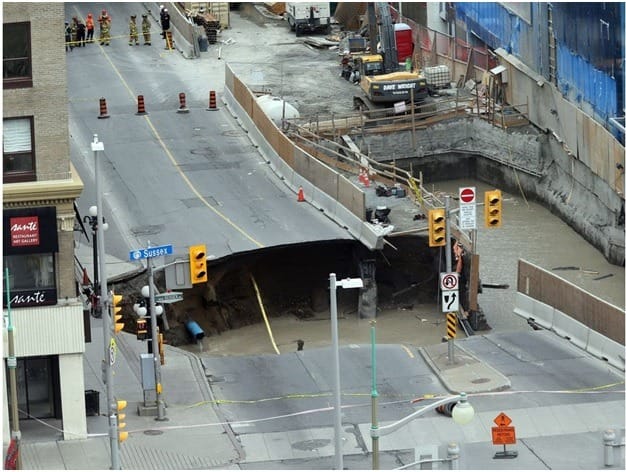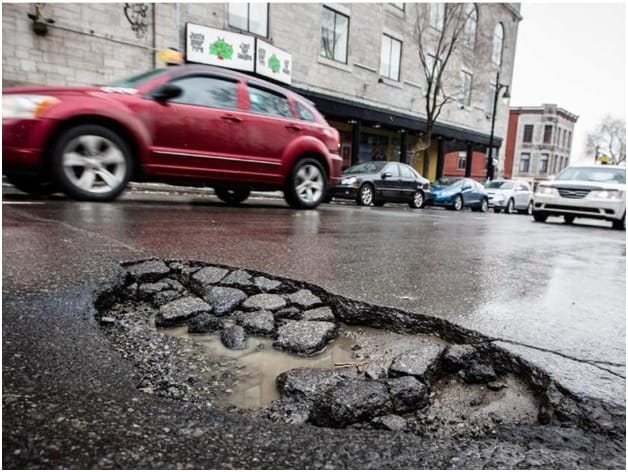
Pothole Season
Earlier this summer, a massive sinkhole opened up across Rideau Street in Ottawa causing chaos in the downtown. A nation watched in horror as the news video showed the sinkhole swallow up a parked vehicle – no one was in the van at the time. The sinkhole resulted in a gas leak causing a massive evacuation, forcing businesses to shut down and causing trouble to commuter traffic around the city’s core, and we thought downtown Ottawa traffic was already bad…hah! On a serious note, it was incredibly fortunate that no one was hurt in this strange and bizarre incident.
After a long winter, that special season of spring begins, bringing with it the rain. That excess rain results in potholes on our well-travelled roads. I know you may be thinking that summer is already a few months in, but it will take municipalities well into late summer to fix all of the potholes popping up around town, not to mention all the ones created from the constant construction projects during the summer.
‘Crunch’
Not the sound you want to hear in your car. If you have ever hit a pothole, you will know why drivers routinely go out of their way to avoid them. Another thing you can do to protect yourself is check your air pressure in your tires. Extreme temperature changes can affect tire pressure, so now is the time to take care of that.
With the proper tire pressure, when you hit a normal pothole, your vehicle should be able to absorb the shock and you can drive away. This is assuming you are not going too fast. However, should the pothole be deeper than average, you could find yourself needing repairs.
At the very least, you will need an alignment. Worst case, you take your car in and when they hoist it up, the bad news can be up to $3000. The repairs can include everything from cracked rims to suspension damage.

Photo: montrealgazette.com
You Hit A Pothole – Now What?
What should you do if you ever hit a pothole? The first thing is to find a safe place to pull over. Then get out and check if there is any damage. Even if you don’t see damage, it is a good idea to take it in and have things checked over.
In the event of pothole damage, your technician may suggest an ailment, tire repair, tire rotation and balance, or undercarriage repairs. Damage to the undercarriage can seriously affect the safety of your vehicle.
If you do sustain damage, you may need to make an insurance claim. Most insurance companies treat this situation as a collision, your deductible comes into play and yes, your insurance rates may increase.
Recently, the Canadian Automobile Association (CAA) did a poll of 2,000 drivers, asking them how much they’d spent repairing damage caused by potholes in the last five years. “Canadians said that potholes cost them $1.4 billion a year,” says CAA spokesperson Kristine D’Arbelles.
Tips Around Potholes
- Check your tire pressure. Odds are, you will need to top it up. Properly inflated tires are the best protection against potholes. You should be checking your tire pressure monthly.
- Slow down and watch out. Since it is pothole season, you likely have already noticed them scattered along your commute. Keep an eye out – and be extra careful during the rainy days as there just may be a pothole under that puddle.
- Try to drive over it. Swerving to avoid it altogether can cause more trouble than its worth – just drive over it. You just want to avoid hitting the hole with your tires.
- Don’t brake. If you practice number two above and slow down, you will be better off than coming up on a pothole and braking. That may be a normal reaction, but it can cause a harsher impact on your vehicle.
- Be extra vigilant while driving through construction zones. These zones are notorious for hosting some of the worst potholes, so try your best to pay attention while going through one.
There are many hazards to watch for on the roads, and potholes in the spring are number one. Take care on the roads, slow down and watch out – whatever situation you find yourself in on the roads, remember Safety First!
You Might Want to Read
June 15, 2025
Sideswipe Collision: Who Is at Fault in Sideswipe Accidents?
June 15, 2025
Least Depreciating Cars in Canada
June 5, 2025
Welcome to the Team Keyes Insurance


